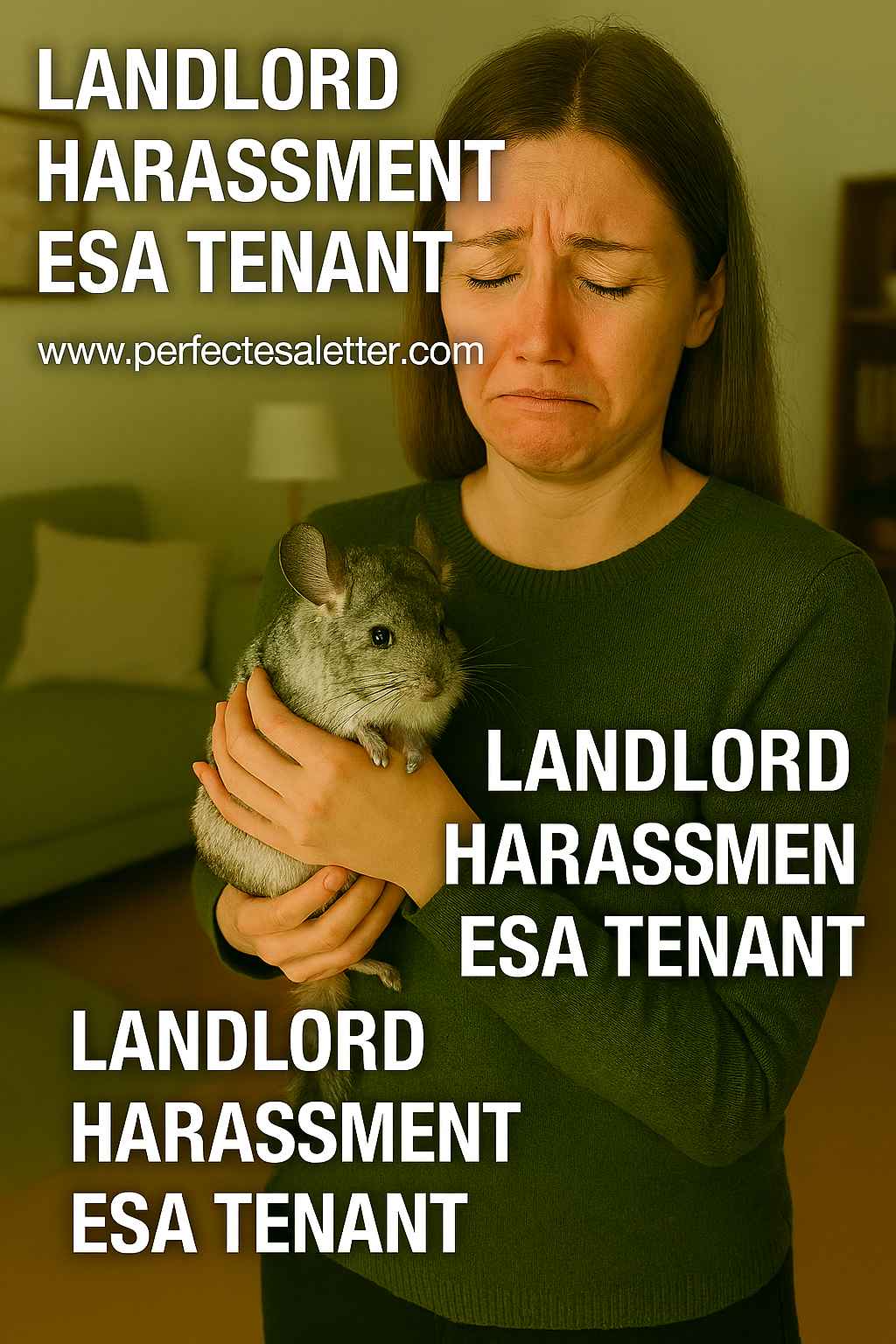How to Handle Landlord Harassment as an ESA Tenant
Article
Introduction
Emotional Support Animals (ESAs) are essential companions for individuals with mental or emotional health conditions. Federal law protects ESA tenants under the Fair Housing Act (FHA), ensuring landlords cannot discriminate or harass tenants for having an ESA.
Unfortunately, some landlords engage in harassment, such as threats, intimidation, or repeated illegal demands, when tenants request ESA accommodations. Understanding your rights and knowing how to respond is crucial for protecting both yourself and your ESA.
”Get Yours Now!
Don’t wait until a landlord or airline tells you “no pets allowed.” Protect your rights today.
Please fill out this form and our team wil contact you ASAP.
Complete your assessment in minutes , get approved by a licensed professional, and receive your letter within 24 hours.
What Constitutes Landlord Harassment
Landlord harassment can take many forms, including:
- Threats or Intimidation
- Verbal threats of eviction, fines, or penalties because of your ESA.
- Repeated Unnecessary Inspections
- Frequent property checks aimed at intimidating ESA tenants.
- Illegal Notices
- Sending warnings, fines, or eviction notices without legal grounds.
- Discriminatory Behavior
- Refusing to communicate or providing poor maintenance due to the presence of your ESA.
- Unreasonable Demands
- Requests for fees, deposits, or certifications not required by law.
Harassment is illegal under federal law, especially if it targets your ESA accommodation rights.
Understanding ESA Tenant Rights
ESA tenants have the following protections:
- Right to Reasonable Accommodation
- Landlords must accommodate ESAs regardless of “no-pet” policies.
- Protection from Discrimination and Retaliation
- Federal law prohibits landlords from retaliating against tenants exercising their ESA rights.
- Right to Safe and Peaceful Housing
- Harassment, intimidation, or threats are violations of tenant rights and may have legal consequences.
- Right to Fair Communication
- Landlords must interact professionally and respectfully when discussing ESA accommodations.
Steps to Take if You Are Being Harassed
- Document Everything
- Keep emails, letters, texts, and notes of conversations.
- Record dates, times, and details of harassment incidents.
- Provide ESA Documentation
- Ensure your ESA letter from a licensed mental health professional is valid and submitted.
- Communicate Professionally
- Respond calmly and clearly in writing.
- Restate your ESA rights and request that the harassment stops.
- Request Mediation
- Some disputes can be resolved through mediation or dispute resolution services before legal action.
- Report to HUD
- The U.S. Department of Housing and Urban Development (HUD) investigates complaints related to ESA discrimination and harassment.
- Seek Legal Assistance
- Contact a tenant rights attorney familiar with ESA laws and Fair Housing Act protections.
Tips to Prevent Landlord Harassment
- Provide Verified ESA Letters – Reduces disputes and challenges from landlords.
- Know Your Lease and Laws – Familiarize yourself with ESA accommodations and tenant protections.
- Communicate Early and Professionally – Notify landlords before moving in and discuss ESA policies upfront.
- Maintain ESA Behavior – A well-behaved ESA decreases complaints and harassment risks.
- Keep Records – Documentation protects you legally if harassment continues.
Real-Life Example
Rachel, an ESA tenant with anxiety, faced repeated warnings and fines from her landlord for having an ESA dog. The landlord claimed it violated the building’s pet policy.
Rachel submitted her valid ESA letter and documented all interactions, including emails and warning notices. She contacted HUD and a tenant rights attorney.
As a result, HUD intervened, and the harassment stopped. The landlord was legally informed that continuing such behavior could lead to fines and legal consequences.
This demonstrates the importance of documentation, ESA verification, and taking timely action against harassment.
FAQs
Q1: What should I do if my landlord harasses me for having an ESA?
👉 Document all incidents, submit valid ESA documentation, communicate professionally, and seek HUD or legal assistance.
Q2: Can harassment include eviction threats?
👉 Yes. Threats of eviction due to your ESA can be illegal and constitute harassment under federal law.
Q3: Can I file a complaint against a harassing landlord?
👉 Yes. HUD and local fair housing agencies accept complaints related to ESA harassment.
Q4: Are landlords allowed to inspect my ESA frequently?
👉 Only for legitimate maintenance reasons. Excessive or targeted inspections may be considered harassment.
Q5: What legal actions can be taken against a harassing landlord?
👉 HUD can investigate and impose penalties, and a tenant rights attorney can file legal claims for discrimination or harassment.
Conclusion
Landlord harassment as an ESA tenant is illegal and should not be ignored. Tenants must understand their rights, provide proper ESA documentation, and take professional steps to protect themselves.
By documenting incidents, communicating effectively, and involving HUD or legal authorities if needed, ESA tenants can safeguard their housing, maintain peace of mind, and ensure their emotional support animal remains part of their life.
”Get Yours Now!
Don’t wait until a landlord or airline tells you “no pets allowed.” Protect your rights today.
Please fill out this form and our team wil contact you ASAP.
Complete your assessment in minutes , get approved by a licensed professional, and receive your letter within 24 hours.

